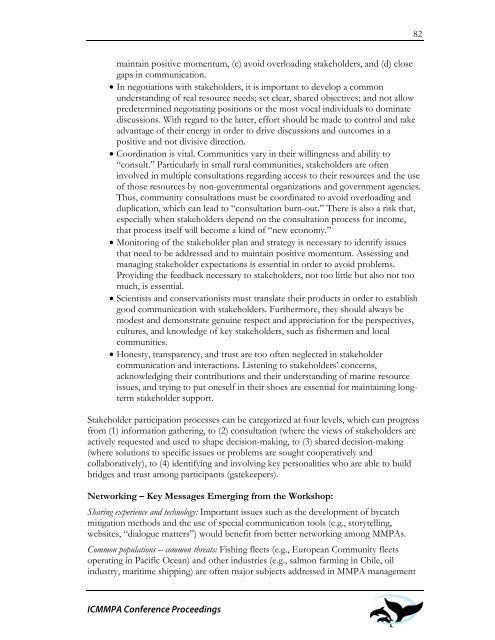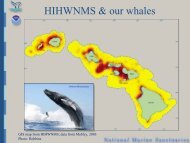The First International Conference on Marine Mammal Protected Areas
The First International Conference on Marine Mammal Protected Areas
The First International Conference on Marine Mammal Protected Areas
Create successful ePaper yourself
Turn your PDF publications into a flip-book with our unique Google optimized e-Paper software.
maintain positive momentum, (c) avoid overloading stakeholders, and (d) close<br />
gaps in communicati<strong>on</strong>.<br />
• In negotiati<strong>on</strong>s with stakeholders, it is important to develop a comm<strong>on</strong><br />
understanding of real resource needs; set clear, shared objectives; and not allow<br />
predetermined negotiating positi<strong>on</strong>s or the most vocal individuals to dominate<br />
discussi<strong>on</strong>s. With regard to the latter, effort should be made to c<strong>on</strong>trol and take<br />
advantage of their energy in order to drive discussi<strong>on</strong>s and outcomes in a<br />
positive and not divisive directi<strong>on</strong>.<br />
• Coordinati<strong>on</strong> is vital. Communities vary in their willingness and ability to<br />
“c<strong>on</strong>sult.” Particularly in small rural communities, stakeholders are often<br />
involved in multiple c<strong>on</strong>sultati<strong>on</strong>s regarding access to their resources and the use<br />
of those resources by n<strong>on</strong>-governmental organizati<strong>on</strong>s and government agencies.<br />
Thus, community c<strong>on</strong>sultati<strong>on</strong>s must be coordinated to avoid overloading and<br />
duplicati<strong>on</strong>, which can lead to “c<strong>on</strong>sultati<strong>on</strong> burn-out.” <str<strong>on</strong>g>The</str<strong>on</strong>g>re is also a risk that,<br />
especially when stakeholders depend <strong>on</strong> the c<strong>on</strong>sultati<strong>on</strong> process for income,<br />
that process itself will become a kind of “new ec<strong>on</strong>omy.”<br />
• M<strong>on</strong>itoring of the stakeholder plan and strategy is necessary to identify issues<br />
that need to be addressed and to maintain positive momentum. Assessing and<br />
managing stakeholder expectati<strong>on</strong>s is essential in order to avoid problems.<br />
Providing the feedback necessary to stakeholders, not too little but also not too<br />
much, is essential.<br />
• Scientists and c<strong>on</strong>servati<strong>on</strong>ists must translate their products in order to establish<br />
good communicati<strong>on</strong> with stakeholders. Furthermore, they should always be<br />
modest and dem<strong>on</strong>strate genuine respect and appreciati<strong>on</strong> for the perspectives,<br />
cultures, and knowledge of key stakeholders, such as fishermen and local<br />
communities.<br />
• H<strong>on</strong>esty, transparency, and trust are too often neglected in stakeholder<br />
communicati<strong>on</strong> and interacti<strong>on</strong>s. Listening to stakeholders’ c<strong>on</strong>cerns,<br />
acknowledging their c<strong>on</strong>tributi<strong>on</strong>s and their understanding of marine resource<br />
issues, and trying to put <strong>on</strong>eself in their shoes are essential for maintaining l<strong>on</strong>gterm<br />
stakeholder support.<br />
Stakeholder participati<strong>on</strong> processes can be categorized at four levels, which can progress<br />
from (1) informati<strong>on</strong> gathering, to (2) c<strong>on</strong>sultati<strong>on</strong> (where the views of stakeholders are<br />
actively requested and used to shape decisi<strong>on</strong>-making, to (3) shared decisi<strong>on</strong>-making<br />
(where soluti<strong>on</strong>s to specific issues or problems are sought cooperatively and<br />
collaboratively), to (4) identifying and involving key pers<strong>on</strong>alities who are able to build<br />
bridges and trust am<strong>on</strong>g participants (gatekeepers).<br />
Networking – Key Messages Emerging from the Workshop:<br />
Sharing experience and technology: Important issues such as the development of bycatch<br />
mitigati<strong>on</strong> methods and the use of special communicati<strong>on</strong> tools (e.g., storytelling,<br />
websites, “dialogue matters”) would benefit from better networking am<strong>on</strong>g MMPAs.<br />
Comm<strong>on</strong> populati<strong>on</strong>s – comm<strong>on</strong> threats: Fishing fleets (e.g., European Community fleets<br />
operating in Pacific Ocean) and other industries (e.g., salm<strong>on</strong> farming in Chile, oil<br />
industry, maritime shipping) are often major subjects addressed in MMPA management<br />
ICMMPA <str<strong>on</strong>g>C<strong>on</strong>ference</str<strong>on</strong>g> Proceedings<br />
82



